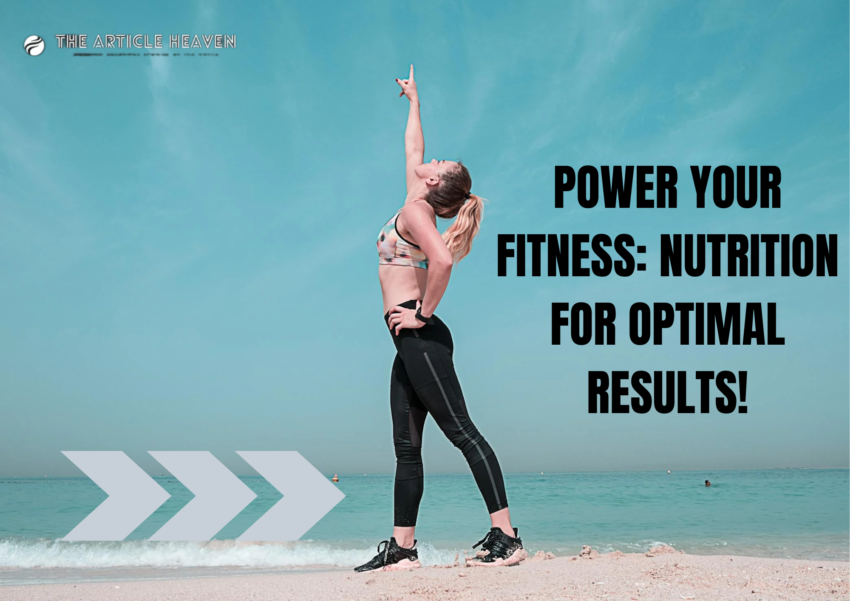Nutrition is a key factor in reaching your exercise objectives, whether they are to increase endurance, lose weight, or develop muscle. Exercise regimen structure is crucial, but a bad diet cannot be outdone. ensuring that your body has the resources necessary to function at its peak, recuperate from injuries fast, and maintain general health all depend on well planned meals. We’ll discuss the value of diet in fitness in this blog, as well as how meal planning can accelerate your progress.
Why Nutrition Matters in Fitness?
Nutrition serves as the foundation for your fitness journey. The food you consume provides your body with the energy it needs to perform during workouts and the nutrients necessary for recovery and growth. Matching your nutrition to your exercise goals can make a big difference in your outcomes, whether your aim is to develop muscle, lose fat, or enhance your overall fitness.
1. Energy for Workouts
Your body uses proteins, lipids, and carbs to make energy. The body prefers to use carbohydrates as fuel for high-intensity exercises like weightlifting and sprinting. Insufficient carbs can make you feel exhausted and make it difficult for you to give your workout your all.
2. Muscle Repair and Growth
Your muscles require protein to grow stronger and heal after an exercise. The amino acids required for this recuperation process are found in protein. If you don’t consume enough protein, you run the danger of hindering your recovery, which can cause discomfort in your muscles and less improvement.
3. Boosting Metabolism
The right mix of macronutrients (carbs, proteins, fats) can help boost your metabolism. For instance, eating protein-rich foods requires more energy for digestion compared to fats or carbs, a process called the thermic effect of food (TEF).An increase in metabolic rate facilitates increased calorie burning all day long.
The Basics of Meal Planning for Fitness:
Meal planning is more than just preparing meals ahead of time; it’s also making sure that each meal supports your fitness objectives and gives your body the nutrition it needs. Here are some essential tactics to maximize your nutritional intake:
1. Determine Your Macronutrient Ratios
The macronutrients—fats, proteins, and carbohydrates—have distinct functions in the development of your fitness. You must strike the ideal balance in order to maximize your output and performance:
- Your primary energy source, especially during intense exercise, is carbohydrate. Fruits, vegetables, and whole grains are great sources.
- Proteins: Essential for the growth and repair of muscles. Lean meats, seafood, eggs, legumes, and plant-based proteins are foods you should try to eat more of.
- Fats: Essential for general health and hormone production. Add nuts, seeds, avocados, olive oil, and other healthy fats.
2. Plan Around Your Workouts
Timing your meals around your workouts can boost your performance and recovery:
- Pre-workout: Consume a balanced meal 1-3 hours before your workout. Focus on carbs for energy and moderate protein to support muscle function.
- Post-workout: Within 30-60 minutes after exercise, aim for a meal rich in protein and carbs to replenish glycogen stores and kickstart muscle recovery.
3. Stay Hydrated
One essential element of fitness diet is hydration. Dehydration can cause poor recovery and decreased performance. Drink lots of water throughout the day, and when engaging in strenuous or lengthy exercise, take into consideration drinking electrolyte-rich beverages.
4. Meal Timing and Frequency
While traditional meal timing strategies like “eating small meals frequently” or “intermittent fasting” can work, it’s essential to find what fits your lifestyle and supports your energy levels. The goal is to keep your body fueled and energized, so you can maintain high performance during workouts and throughout your day.
Advice for Efficient Meal Planning:
- Prepare ahead of time: Set aside a day or two each week to prepare meals. Prepare and divide your food in advance to ward against the urge for junk food or fast food.
- Use entire, Unprocessed Foods: Choose entire foods such as vegetables, fruits, whole grains, lean meats, healthy fats, and whole grains. Steer clear of overly processed foods that are heavy in sugar, sodium, and bad fats.
- Monitor Your Progress: Pay attention to how your body reacts to the meals you are eating. Based on your results and how you feel throughout exercises, alter the macronutrient ratios and portion sizes as necessary.
- Remain Consistent: Observing results requires consistency. Over time, following your meal plan will help you stay on track and reach your fitness goals.
We are The Article Heaven, the most sincere website that provides readers with the best and most reliable content in a variety of formats, including blogs, articles, news, and more, enabling them to find the knowledge and information they need and being inspired to learn more about the world around them.
